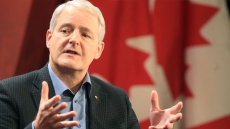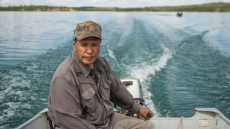TORONTO — Premier Kathleen Wynne says Stephen Harper is standing in the way of an Ontario pension plan, while the prime minister says he's happy to block what he calls "an enormous tax hike."
"I am delighted to see, quite frankly, that our refusal to co-operate with the imposition of this tax is making it more difficult for the Ontario government to proceed," Harper said at a campaign stop in Markham, north of Toronto. "We're going to continue to fight it."
Harper went out of his way to attack the Liberal government's pension plan Tuesday after reporters failed to ask him about it, returning to the microphone to say the mandatory contributions from employers and workers would kill jobs.
"It's not a good idea for the middle class and it's obviously a bad thing as well for jobs and it's a bad thing for our economy," he said.
Wynne, meanwhile, was unveiling details of the Ontario Retirement Pension Plan during a news conference in downtown Toronto, where she said workers are not saving enough for retirement and Harper refuses to enhance the Canada Pension Plan.
"Disappearing workplace pension plans, shrinking personal savings ... and an average yearly CPP payment of less than $7,000 all adds up to a wholly inadequate retirement savings system," she said.
Wynne vowed to proceed with a provincial pension even without any help from the federal government or the Canada Revenue Agency, but she couldn't say how much more it would cost Ontario to go on its own or contract out to a third party.
"We don't know what those costs would be at this point," she said. "We do know that it would be easier, (and) it certainly would be less complicated if we had the federal government working with us."
Business groups have been warning they may have to reduce staff or curb hiring because of the added costs of a mandatory provincial pension plan, and said Tuesday they still had concerns.
The Canadian Federation of Independent Business said most small- and medium-sized businesses don't have a pension plan not because they don't want one, but because they can't afford it.

"We are very disappointed today that there has been absolutely no regard in terms of the actual impact of the ORPP on the small business community, on their employees," said Plamen Petkov, the group's Ontario vice-president. "Phasing (it) in makes it probably look a little bit better politically, but if you're a small business owner and you know this is coming your way...you may be reducing jobs, you may be reducing hours."
The Canadian Federation of Independent Grocers said its members operate on profit margins of just one per cent, and can't afford to pay new pension premiums.
"If you're putting in a plan to deduct 1.9 per cent off the employers' payroll, that's going to be a difficult pill to swallow," said spokesman Gary Sands.
The Ontario Chamber of Commerce called the exemption details a step in the right direction, but said larger companies want to see a cost-benefit analysis on the pension plan, which the government promises to produce by the end of the year.
The new pension plan will force companies to pay premiums of 1.9 per cent of salary for each employee, up to $1,643 a year, and workers will pay an equal amount. It will be phased in starting in 2017 for employers with 500 or more workers and no workplace pension, to be followed by medium-sized employers on Jan. 1, 2018. Those with 50 or fewer employees will be enrolled on Jan. 1, 2019.
Companies with defined contribution pension plans that equal at least eight per cent of an employee's salary would be exempt from the plan, as long as the employer contributes at least four per cent.
Employers with a workplace pension plan that isn't adjusted to meet the government's comparability test, as well as employees who aren't members of their workplace comparable plan will start contributions on Jan. 1, 2020.
The government defines a comparable plan as one that provides a "predictable stream of replacement income and an adequate standard of living in retirement similar to the benefit that would be provided by the ORPP."
Ontario passed legislation in April to create the provincial pension for more 3.5 than million people who do not have a workplace pension.



